Contents
Growing lettuce in a greenhouse is a business that can be done throughout the year. This crop does not require special care, is simple in terms of agricultural technology, and is growing rapidly. Many are engaged in its cultivation for commercial purposes and receive a good income from this, especially during the cold season. Even a small, well-equipped greenhouse allows you to make good money.
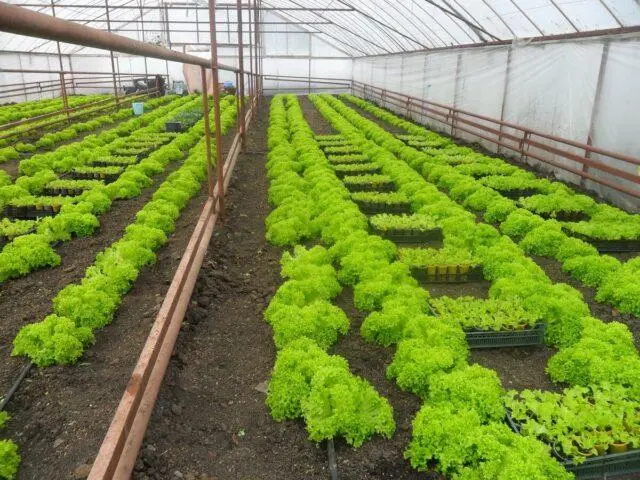
Lettuce, which is grown indoors, grows rapidly, brings a large harvest and almost does not get sick
Choice of lettuce variety
The culture is represented by a huge number of varieties. Almost all of its varieties are suitable for growing in greenhouse conditions, but most often gardeners prefer early-ripening representatives of the 1st class plant. They have high yields, good taste and ripen quickly. It is better to choose leafy varieties, the cleaning of which consists in cutting the leaves, while the root system of the plants remains in the ground. Often for growing indoors choose salad Aficion (Aficon), Ballet (Valet), Dubrava, Kitezh, Odessa Kucheryavets (Kucheryavec Odesskiy), Tornado (Tornado).
Sometimes in the greenhouse they grow semi-headed varieties. They are characterized by a raised leaf rosette, in the center of which a head is formed during the growth stage. Such varieties are distinguished by an average growth rate and are usually cultivated from seedlings. The following species are more suitable for greenhouses: Berlin yellow (Berlinskiy Jeltiy), Stone heads (Kamennaya Golovka), Festivalny (Festivalniy).
There are also head lettuce varieties with a longer ripening period. They are demanding on care, lighting and other conditions. Common are Iceberg (Iceberg), Excitement (Azart), Crunchy.
Red-leaved varieties of crops are in high demand among individual gardeners. The color of their green mass becomes brown due to weather conditions. They acquire an interesting color in a cool microclimate.
greenhouse requirements
Growing lettuce in a greenhouse will be effective if all requirements for the planting site are met. Before cultivating a plant in closed ground conditions, it is important to study the features of this method of producing greens.
The room in which the cultivation of lettuce will take place must meet the following requirements:
- Quality material. In order for the greenhouse to be warm in winter, the design must be reliable, it is advisable to stand on a foundation. Its size is chosen based on the purpose of cultivation. From a small area it will not be possible to harvest a large crop, and a spacious greenhouse will pay off for a long time. For a small business, a design of 8-10 square meters is enough. Its optimal size is 500×200. You can choose the material for the coating: film, polycarbonate, glass, for the frame: metal, wood.
- Good heating. It is most convenient to use infrared heaters to warm up the greenhouse. In addition, a wood-burning stove can be installed indoors. Mulch and agrofibre will help maintain the temperature well.
- Quality watering. When growing lettuce in greenhouse conditions, it is especially important for him to ensure regular watering with warm and clean water. The best option is a drip irrigation system.
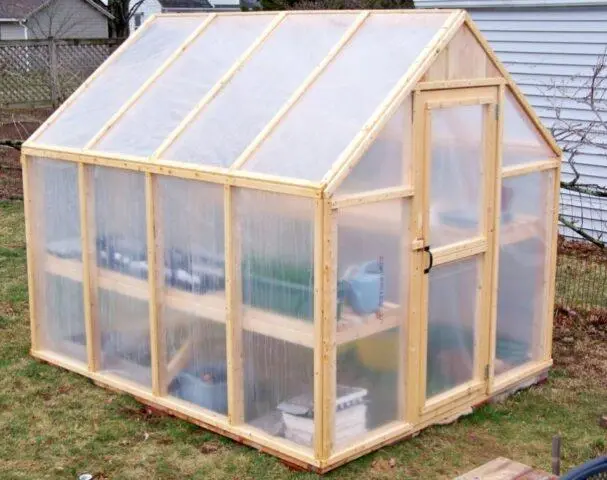
Some make greenhouses with their own hands
How much lettuce grows in a greenhouse
If the cultivation of the crop takes place under properly created conditions and in compliance with all recommendations, then in the greenhouse to a suitable size for consumption, the salad ripens quite quickly. After germination, it takes about 22 days to harvest with good taste.
The yield of lettuce in greenhouses with m2 also depends on the variety and care. On average, from a square meter, it is possible to collect from 1,5 to 2 kg of greenery.
When to plant lettuce
You can sow lettuce seeds indoors almost all year round. If planting is done in September, then it will be possible to harvest until January. Some gardeners plant crops immediately after the New Year holidays, in which case fresh greens are cut until mid-March. If the structure is not heated, then the plant is grown from the second half of March until the last days of April (the exact dates depend on the climatic features of the region).
Seedlings of culture in greenhouses are usually planted at the age of a month. A few days before the work, they begin to harden it, for which they take it out of the house to the greenhouse for several hours, gradually increasing the time spent there.
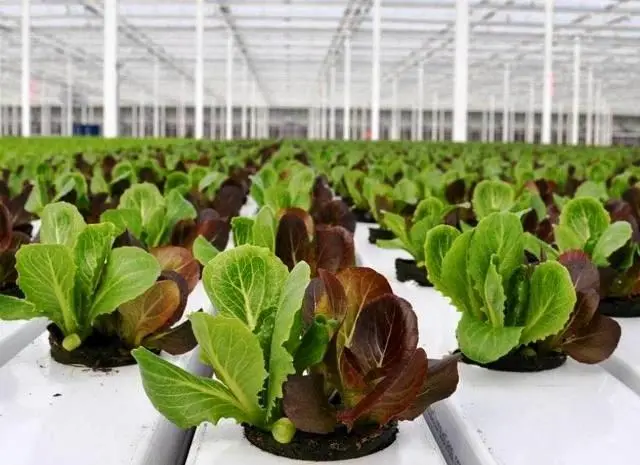
The salad is especially in high demand during the winter holidays.
How to grow lettuce in a greenhouse in winter
Growing lettuce leaves in a greenhouse is not a particularly laborious process, which, in principle, can be done even by people who do not have special knowledge in agricultural technology. The main thing in the process is to create suitable conditions for planting, as well as organize proper care throughout the growth.
Preparing to plant lettuce in a greenhouse
Growing useful greens in a greenhouse involves a number of preparatory work. Lettuce seeds are small, so they are planted in loose soil without lumps. Before work, it is recommended to fill the beds with organic fertilizers (peat, humus, sand), and also treat with disinfectants (spill with boiling water or potassium permanganate). It is useful to add 40 g of superphosphate and 15 g of potassium chloride for each meter of the site.
The scheme of planting lettuce in the greenhouse
Usually, to plant lettuce in a greenhouse, gardeners follow the following instructions:
- The soil is loosened and moistened.
- Grooves are made in the beds with a width between rows for leafy varieties of at least 20 cm, for headed varieties about 35-45 cm.
- Planting material is deepened by 8-10 mm.
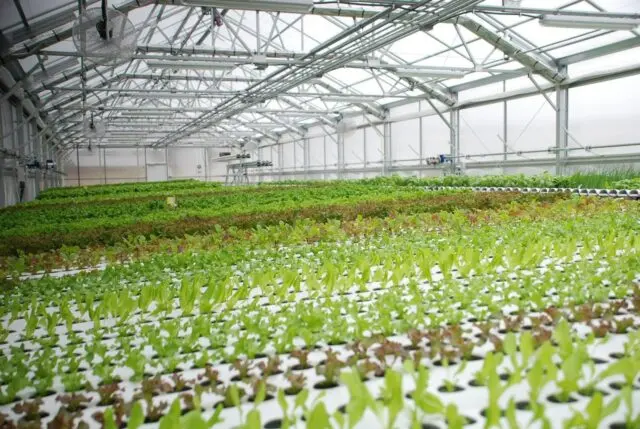
After germination, it is especially important to monitor the microclimate in the greenhouse
Aftercare
Lettuce, which was grown indoors, does not need a large number of care procedures. All recommendations can usually be read on the packaging with the seeds of the plant. Plantings are watered until germination occurs every other day, and after the sprouts appear on the surface of the earth, the frequency of moistening is reduced to two times a week. At the same time, warm water is used, it is desirable to use the drip method of moisturizing. The procedure is performed under the root, trying not to get on the foliage. Row spacing is loosened about once a month. When growing a plant in a greenhouse in sunny weather, they are opened and ventilated, but at the same time avoiding a draft. Attention should be paid to the lighting of the beds. If the salad experiences a lack of light, then it will begin to stretch. In the case when the daylight hours are short, additional lamps will have to be installed in the greenhouse. As for the temperature regime, the culture loves warmth, but does not perceive heat very well. During the day in the greenhouse should be about + 17-20 ° C, at night + 10 ° C. Lettuce responds well to fertilizers. As a top dressing, potassium chloride, urea, ammonium nitrate are perfect.
Diseases and pests
When growing lettuce in a greenhouse, you may encounter some of their diseases, sometimes with pests. Most often, this culture is exposed to fungal diseases that occur due to the use of infected seeds or soil, as well as non-compliance with the irrigation regime. Young lettuce is most at risk. Of the common ailments, one can distinguish: downy mildew, rot, black leg.
As for pests, aphid likes to attack the culture, and special means are used to combat it. Also lettuce can be attacked by slugs and lettuce fly.
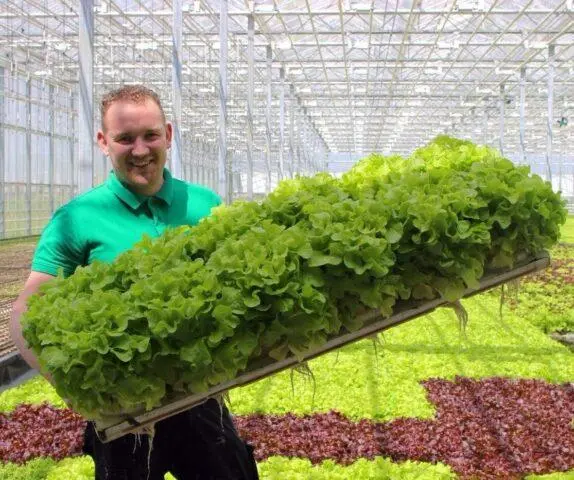
To protect plantings, it is recommended to observe agricultural technology and carry out the prevention of ailments
Harvesting
During the cultivation of lettuce in a greenhouse, gardeners begin to harvest at the moment when the leaves of the plant reach a length of about 9 cm. If the culture is a head variety, then it is cut off after the head is fully developed. It is not recommended to water the lettuce before work, as this has a negative impact on the storage and presentation of the product. Also, the collected greens can not be washed.
Experienced gardeners note that it is better to cut lettuce leaves in the early morning or evening. At the same time, they must be loosely and neatly placed in boxes and sold as soon as possible. When cultivating lettuce in closed conditions, its shelf life is about one and a half days.
Conclusion
Growing lettuce in a greenhouse can be done all year round and with the creation of suitable conditions for the culture, as well as proper care, excellent results can be achieved in this matter. Lettuce is a very useful plant, widely used in cooking, and for some dishes, especially festive ones, it is an indispensable ingredient. Growing lettuce in a greenhouse as a business is not a bad idea. Since the culture is not particularly demanding and matures quickly, it can bring a good income to the gardener.









